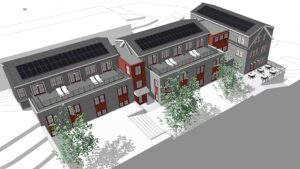PROVINCETOWN — Businessman Patrick Patrick, developer of a proposed seasonal dormitory and apartment building known as “The Barracks,” is seeking financial support from the town for the project, including $1.8 million from Provincetown’s housing funds.

Patrick and project adviser Michael MacIntyre on Feb. 26 updated the select board on plans for the property at 207 Route 6, just west of the intersection with Shank Painter Road.
The proposed 26,000-square-foot building will contain 28 four-person seasonal dormitory rooms, 8 “mini one-bedroom” units, 6 studio apartments, and a three-bedroom manager’s unit, for a total of about 130 residents. Patrick, who owns Marine Specialties on Commercial Street, received the final permits for the project in 2021 but was tied up in litigation with neighbors for several years before reaching a settlement with them last spring.
The presentation focused on financials — including the rents Patrick would be charging — and on his request for financial support from the town in the form of a property tax abatement, forgiveness of his wastewater fees, and the $1.8 million contribution.
Select board members said they support the project, but they had numerous questions about Patrick’s plans.
Board member Leslie Sandberg said the rent schedule Patrick proposed “seems a little steep.”
Patrick had said his dormitory beds would cost $4,500 if he rents them out for a period of under 20 weeks or $6,000 for a longer season of up to 36 weeks. His 219-square-foot studio apartments would rent for $1,900 a month, the 325-square-foot “micro one-bedrooms” would be $2,000 to $2,300 a month, and the 388-square-foot “mini one-bedrooms” would rent for $2,300 to $2,500 a month.
Sandberg said that $1,900 for a studio with utilities included was “where the market is right now,” but that the mini one-bedrooms seemed unaffordable.
“I believe the fair market rent for a two-bedroom in Barnstable County is $2,400,” Sandberg said. “You have a one-bedroom for $2,400 and $600 more for indoor parking. This is supposed to be affordable to working people.”
Patrick said that he expected most of the building’s tenants to opt for the free outdoor parking — and that if they did, he would rent the indoor parking spaces to people who don’t live in the building.
The select board was skeptical of the parking charges, and Sandberg asked town staff to research whether Patrick could legally rent out parking spaces that were required by zoning to nonresidents.
The $1.8 million requested contribution also sparked disagreement when Patrick told the select board that in exchange he would give the town year-round occupancy deed restrictions on 12 of the 15 apartments and priority to town staff for four of the units.
Board members said they thought all 15 apartments were already restricted by the conditions of Patrick’s permits.

“What would the other three apartments be used for?” asked Sandberg.
“I would like to keep those three unrestricted, and they could sometimes have short-term use,” said Patrick. “The idea is that if residents have family or friends visiting, they can reserve an apartment for a few days.”
“You’ve got three permits — an economic development permit, a special permit from the planning board, and your zoning permit — and they all say these units are supposed to be for workforce housing, either year-round or seasonal,” said Sandberg. “I don’t know that that’s an appropriate use.”
A discussion ensued about exactly what restrictions Patrick had agreed to in the three permits.
“The economic development permit says, ‘Weekly rental or transient occupancy is prohibited — seasonal or year-round rental housing only,’ ” said Community Development Director Tim Famulare.
“They’re restricted to 30-day minimum occupancy — that’s all,” said Patrick. “The restriction is based on the town’s definition of workforce housing at the time, which was 30 days or more.”
The town’s zoning bylaw defines “employee housing” as being rented “on a seasonal or year-round basis, but must be for more than one month.” There are no income or employment standards in the bylaw.
In October 2022, the Provincetown Planning Board pulled an employee housing bylaw from a special town meeting warrant when it realized that the town’s definition of “employee housing” was so loose.
“I can’t understand what ‘30-day workforce housing’ is,” said select board member John Golden. “What does that even mean?”
The board also questioned Patrick’s plan to have employers pay $1,800 per bed to secure dormitory space for their employees and $380 to $500 per month in reservation fees for the apartments. Those fees would be in addition to the rent paid by tenants and would continue for at least the first five years, according to Patrick’s presentation.
“This is not the traditional landlord-tenant model — you’re licensing these to businesses and charging them a fee,” said Sandberg. “But for the year-round units, after the first year, why would a business pay an ongoing reservation fee for a unit they already have?”
“We’re trying to get the employer to make a continued contribution in the overall picture to keep the rents down for the residents,” Patrick said.
Board chair Dave Abramson asked when Patrick would need a financial commitment from the town. “We could only give you a soft commitment letter, you know — we can’t guarantee anything without a vote of town meeting,” Abramson said.
Patrick said a soft commitment would still help him secure the $2 million state loan and $6 million bank loan that he was seeking.
“We won’t be giving you an answer now because we have to have a discussion among ourselves,” said Abramson. “But thank you. It’s exciting to see this project approaching shovel-ready.”



